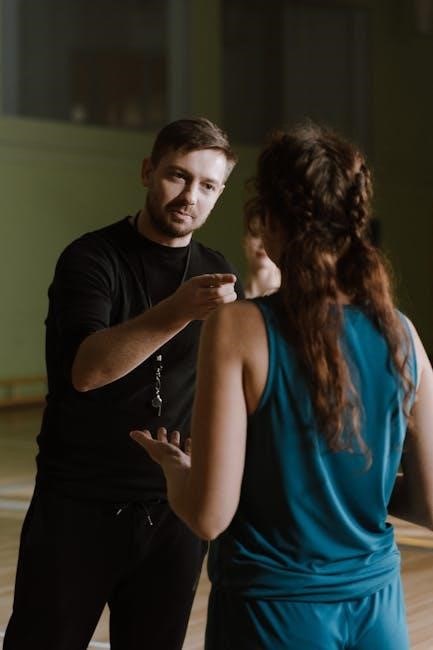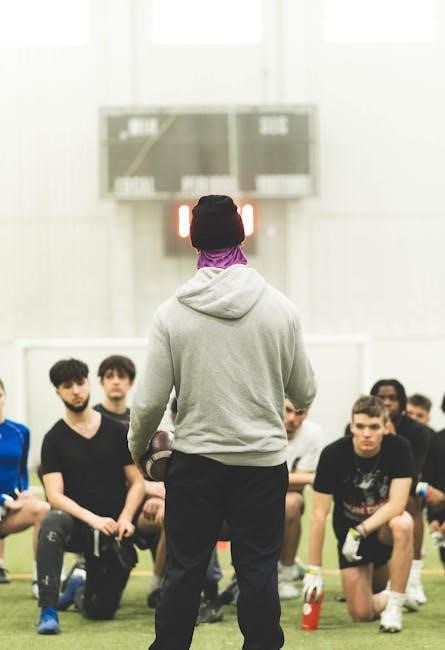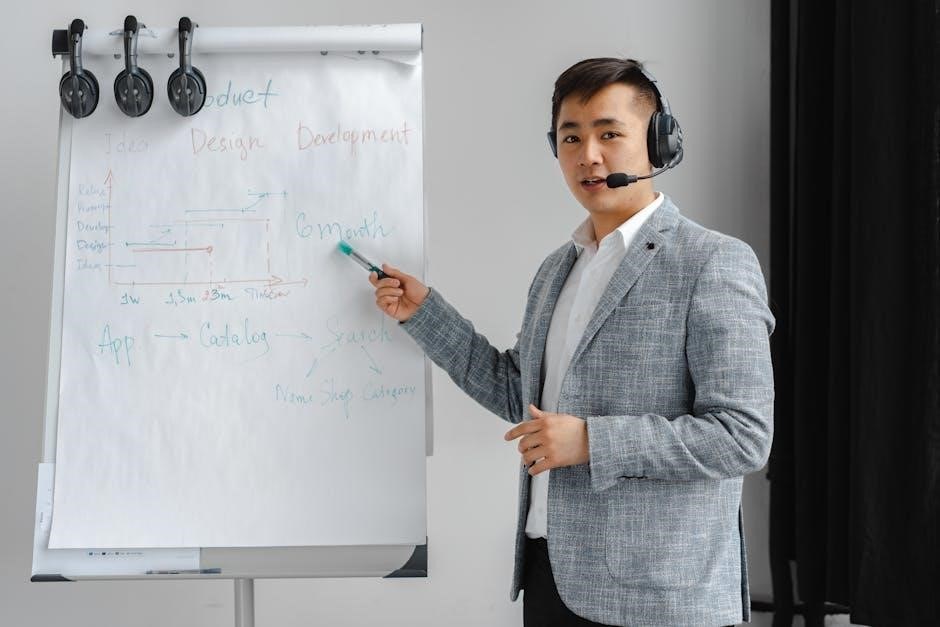The JROTC Leadership Education and Training Program prepares high school students for leadership roles by fostering teamwork, personal responsibility, and character development through structured education․
It emphasizes employability skills, citizenship, and respect, providing cadets with a foundation for future success in both military and civilian life;
1․1 Overview of the JROTC Program of Instruction
The JROTC Program of Instruction (POI) is a structured curriculum designed to develop leadership, citizenship, and life skills in high school students․ It emphasizes teamwork, personal responsibility, and character education, aligning with the Department of Defense’s framework․ The program is divided into a four-year sequence, with each year focusing on specific themes such as leadership theory, civic responsibility, and practical application․ Cadets engage in classroom instruction, hands-on activities, and community service, fostering a well-rounded educational experience․ Instructors, often retired military personnel, guide students through lessons tailored to their grade level, ensuring a progressive learning environment․ This comprehensive approach prepares students for future challenges, whether in military or civilian life․
1․2 Importance of Leadership Development in JROTC
Leadership development is the cornerstone of the JROTC program, fostering essential skills that empower students to excel in various aspects of life․ By emphasizing teamwork, personal responsibility, and character education, JROTC equips cadets with the abilities to lead effectively and make informed decisions․ These skills are vital for both military and civilian contexts, preparing students to address future challenges confidently․ The program’s focus on employability skills ensures that participants are well-prepared for the workforce, while community service activities reinforce civic responsibility and the value of contributing to society․ Through structured training and real-world applications, JROTC cultivates leaders who are not only capable but also committed to making a positive impact in their communities․

Structure of the JROTC Program of Instruction
The JROTC Program of Instruction is structured to provide a comprehensive education in leadership, citizenship, and life skills through a well-organized curriculum and hands-on activities․
It includes both classroom instruction and practical training, ensuring cadets develop essential competencies in leadership, teamwork, and personal responsibility, preparing them for future challenges․
2․1 Leadership Education and Training (LET) Curriculum
The LET curriculum is the cornerstone of the JROTC Program of Instruction, designed to equip cadets with leadership skills through a structured and progressive learning pathway․
It incorporates modules on leadership theory, communication, decision-making, and problem-solving, ensuring cadets gain practical knowledge and hands-on experience to become effective leaders in their communities․
By integrating real-world scenarios and team-based activities, the LET curriculum fosters personal growth, accountability, and a strong moral foundation, preparing cadets for future leadership roles․
2․2 Components of the Program of Instruction
The JROTC Program of Instruction (POI) is structured to include leadership theory, communication skills, and practical exercises to build well-rounded cadets․
Key components focus on decision-making, problem-solving, and teamwork, ensuring cadets develop the ability to lead and collaborate effectively in diverse situations․
The curriculum also emphasizes character education and citizenship, preparing students to contribute positively to their communities while upholding high moral standards․
Key Elements of Leadership Development
Leadership development in JROTC focuses on decision-making, problem-solving, and communication, fostering confident leaders who can inspire and guide others effectively in diverse challenges․
3․1 Teamwork and Collaboration
Teamwork and collaboration are cornerstone values in JROTC, emphasizing collective effort to achieve shared goals․ Cadets learn to work cohesively, valuing diverse perspectives and contributions, fostering unity and mutual respect․ Through group activities and projects, they develop essential communication and cooperation skills․ These experiences prepare cadets to function effectively in team-oriented environments, whether in future military or civilian roles․ The program highlights the importance of trust and reliability among team members, ensuring successful outcomes in both academic and real-world scenarios․ By nurturing these collaborative skills, JROTC equips cadets to lead and thrive in dynamic, interconnected settings․
3․2 Personal Responsibility and Character Education
Personal responsibility and character education are integral to JROTC, fostering accountability and ethical decision-making․ Cadets learn to embrace accountability for their actions, decisions, and goals, while developing strong moral principles․ The program emphasizes self-discipline, integrity, and respect, shaping cadets into responsible individuals․ Through structured activities and mentorship, JROTC helps students build a sense of duty and commitment․ These values are reinforced through community service and leadership exercises, preparing cadets to make positive contributions in their communities․ By instilling personal responsibility and character, JROTC equips students with the foundation needed for success in both military and civilian life, ensuring they become compassionate and ethical leaders․

Role of Instructors in JROTC
JROTC instructors are responsible for teaching leadership skills, ensuring equal access to education, and fostering a respectful environment for all cadets․
4․1 Qualifications and Responsibilities of JROTC Instructors

JROTC instructors must meet specific qualifications, including military experience and teaching certifications, to effectively guide cadets in leadership development․
Their responsibilities include designing curriculum, conducting classes, and mentoring students to build character and employability skills, ensuring a supportive learning environment․
Instructors also promote teamwork and personal responsibility, fostering citizenship and respect among cadets through structured activities and community engagement․
4․2 Methods of Teaching Employability Skills
JROTC instructors use a combination of hands-on activities, group projects, and real-world applications to teach employability skills, fostering practical learning experiences for cadets․
Classroom instruction is supplemented with mentoring, feedback systems, and community service, ensuring students develop teamwork, communication, and problem-solving abilities essential for future success․
These methods create a well-rounded educational environment that prepares cadets for both academic and professional challenges, emphasizing leadership and personal growth․
Cadet Engagement and Participation
Cadet Engagement and Participation involve active involvement in structured JROTC activities, fostering leadership skills and teamwork through collaborative efforts and community service, enhancing their overall development․
5․1 Opportunities for High School Students (Grades 9-12)
The JROTC program offers high school students in grades 9-12 diverse opportunities to develop leadership, citizenship, and life skills․ Cadets engage in classroom instruction, physical training, and community service, fostering personal growth and teamwork․ The program is inclusive, ensuring equal access for all students, regardless of background or ability․ By participating in JROTC, students gain valuable experience that prepares them for future academic and professional endeavors, whether in the military or civilian sectors․ These opportunities enhance their confidence, discipline, and ability to contribute positively to their communities․
5․2 Equal Access to Education and Training
The JROTC program ensures equal access to education and training for all students, regardless of their background, gender, or ability․ This inclusivity promotes diversity and fairness, allowing every cadet to benefit from the program’s curriculum and activities․ By adhering to this principle, JROTC fosters an environment where all students can thrive and reach their full potential․ The program’s commitment to equality aligns with its mission to develop well-rounded individuals prepared for future challenges․ This approach not only enriches the learning experience but also strengthens the sense of community and mutual respect among cadets․

Community Service and Civic Responsibility
JROTC emphasizes community service, fostering civic responsibility through volunteer activities, environmental efforts, and outreach programs․ These experiences help cadets develop a sense of duty and social awareness․
6․1 Role of JROTC in Fostering Citizenship
The JROTC program plays a pivotal role in fostering citizenship by instilling values of patriotism, duty, and respect for the law․ Through structured activities, cadets are encouraged to actively participate in their communities, developing a sense of social responsibility․ The program emphasizes the importance of contributing to the well-being of society, which aligns with the broader goals of leadership development․ By engaging in community service and civic activities, cadets learn to appreciate the significance of their roles as future citizens․ This aspect of JROTC ensures that students are not only prepared for leadership but also for their responsibilities within their communities․
6․2 Community Service Activities and Their Impact
JROTC emphasizes community service as a cornerstone of its program, encouraging cadets to engage in activities that benefit their local communities․ These activities include food drives, park cleanups, charity events, and disaster relief efforts․ Such initiatives not only address immediate community needs but also foster a sense of responsibility among cadets․ By participating in these efforts, students develop empathy and understanding of societal challenges․ The impact of these activities extends beyond the community, as they help cadets build leadership skills, teamwork, and a commitment to service․ These experiences prepare cadets to become active contributors to society, aligning with JROTC’s mission to develop capable and compassionate leaders․